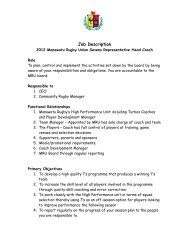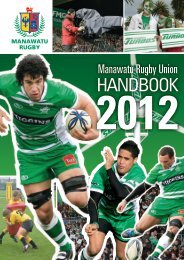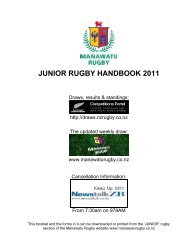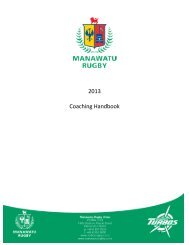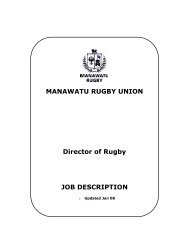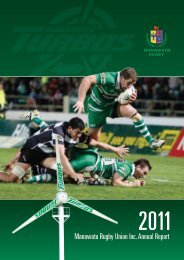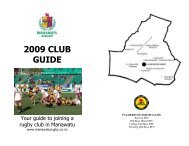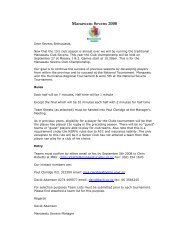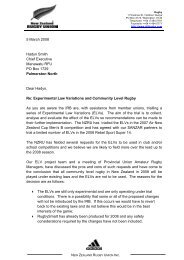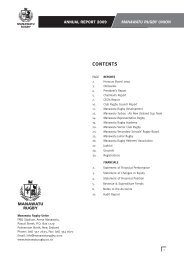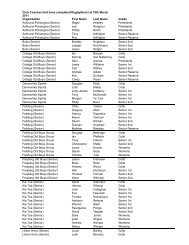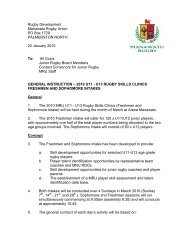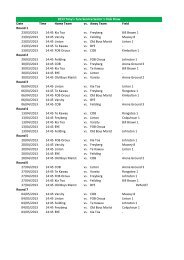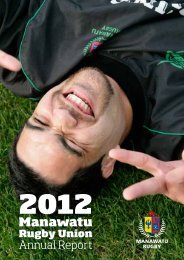Example School Club Plan - Manawatu Rugby
Example School Club Plan - Manawatu Rugby
Example School Club Plan - Manawatu Rugby
Create successful ePaper yourself
Turn your PDF publications into a flip-book with our unique Google optimized e-Paper software.
The <strong>Club</strong> Secretary<br />
2 running SPORT<br />
The <strong>Club</strong> Secretary<br />
Contents<br />
page<br />
1. Why Do You Need a Secretary? 2<br />
2. Professional Skills and Qualities 2<br />
3. Where to Find the Secretary 3<br />
4. Role and Responsibilities 3<br />
a. Mail/Correspondence 3<br />
b. Meeting Procedures 4<br />
c. Communication and Public Relations 5<br />
d. Record Maintenance and Filing Systems 6<br />
e. Wordprocessing 7<br />
f. Administration 7<br />
g. 2
The <strong>Club</strong> Secretary<br />
1. Why do you Need a Secretary<br />
The secretary is the key administration officer of the club. This person provides the link between members,<br />
the club executive committee and outside agencies (such as other clubs and organisations). The position of<br />
secretary is critical to the successful management of any club or organisation.<br />
The secretary is often the first point of contact for people interested in the club who need information or<br />
details about activities. An effective secretary also helps in co-ordinating club events such as meeting<br />
schedules, working bees and fundraising activities.<br />
The secretary’s role is a challenging one. Often not seen as high profile, in actual fact the secretary is a key<br />
pivot point for all the club’s activities. This person is a valuable member of the club and contributes<br />
continuously to its success. Every effort should be made to support and value this person, whose duties<br />
may sometimes be repetitive and time consuming.<br />
In many clubs, the hard work of the secretary is often recognised by an honorarium (a small payment made<br />
for the service given).<br />
2. Professional Skill and Qualities<br />
What is a Secretary?<br />
The international definition states:<br />
A SECRETARY…<br />
− shall be defined as an executive assistant who possesses a mastery of office skills, demonstrates the<br />
ability to assume responsibility without direct supervision, exercises initiative and judgement and makes<br />
decisions within the scope of assigned authority.<br />
3<br />
Administration Skills<br />
Well organised<br />
Task and time efficient<br />
Good communicator<br />
Competent word processing skills<br />
Telephone skills<br />
Understanding of office systems and procedures<br />
Dedication and loyalty<br />
Goal oriented and self motivated<br />
Decision making and delegation thinker<br />
Management and supervision of other staff / volunteers<br />
Personal Qualities<br />
lots of energy and enthusiasm<br />
an interest in people<br />
Initiative<br />
tact and discretion<br />
Commitment<br />
good listening skills<br />
good understanding and knowledge of the<br />
organisation and its activities<br />
reliable and trustworthy<br />
problem solver and positive thinker<br />
The above is a very comprehensive list. However, if someone has the enthusiasm for the position, some of<br />
the necessary skills, and receives plenty of encouragement and committed support, they will grow to<br />
become a valuable club asset.
The <strong>Club</strong> Secretary<br />
3. Where to Find the Secretary?<br />
A good secretary is often found from within your organisation. There are many myths about the workload<br />
and the little thanks the secretary receives.<br />
Through good communication and a clear description of the tasks involved, the position can be interesting<br />
and provide involvement. Your secretary is often someone who has a keen interest in the organisation4and<br />
wants to see the organisation progress. They may or may not be actively involved in the organisation’s<br />
activities. They may be from a member’s family, former participants or keen spectators of club events. With<br />
good support, previously well-maintained records, and clear instructions on what has to be done, many<br />
enthusiastic volunteers have become effective secretaries for their club.<br />
Another source of secretarial help may come from secretaries currently training at a local polytechnic or<br />
college.<br />
4. Role and Responsibilities<br />
These will vary from organisation to organisation. As a guide we have divided the role into core<br />
responsibilities and additional responsibilities.<br />
Core Responsibilities<br />
a. Mail/correspondence - inward/outward<br />
b. Meeting procedures (including minutes)<br />
c. Communication and public relations - inward/outward<br />
d. Record maintenance and filing systems<br />
e. Word processing<br />
f. Administration supplies/equipment/keys<br />
Additional Responsibilities<br />
There are additional responsibilities:<br />
− Managing/supervising other staff/volunteers<br />
− Arranging functions<br />
− Supporting club events/activities<br />
− Other activities as appropriate to skill and interest.<br />
CORE RESPONSIBILITIES<br />
a. Mail/Correspondence<br />
Inward<br />
• Regularly clear the mailbox.<br />
• Enter all inward mail received in mail book<br />
a. You can purchase a printed mail book from a stationer.<br />
b. Make up your own blank sets in a binder.<br />
c. It’s a good idea to date stamp all incoming mail.<br />
• Recording mail and copy distribution supports you in case members claim they did not received the<br />
information<br />
• Acknowledge all letters promptly.<br />
• Ensure you clear the mailbox within 24 hours of a committee meeting, keeping correspondence matters<br />
up to date.<br />
• Prepare a list of correspondence for yourself prior to meeting, listing key points for each item.<br />
6
The <strong>Club</strong> Secretary<br />
Outward<br />
• Reply promptly to correspondence.<br />
• File copies of all correspondence and replies in club records.<br />
• A trend in recent years is to discontinue the correspondence record and table all correspondence by<br />
listing these items on the agenda. They can then be taken as ‘read’. Members can request information<br />
if needed<br />
b. Meeting Procedures<br />
Meeting Preparation<br />
• Contact chairperson and confirm agenda items.<br />
• Send out notice and agenda for meeting to all people concerned at pre-determined time set by<br />
committee. Members should be aware of meeting date as this was the final item on minutes of previous<br />
meeting. Enclose minutes of previous meeting if not already circulated<br />
• Confirm arrangements at meeting location for resources/catering/photocopying etc.<br />
- Be there to open the building/room (at least 30 minutes prior to meeting).<br />
- Arrange chairs for members.<br />
- Arrange table for chairperson/secretary/treasurer.<br />
- Check catering arrangements.<br />
- Supplies of milk/tea/coffee/fruit juice/water/biscuits and hot water<br />
• Check your resources.<br />
- Diary<br />
- Correspondence files<br />
- Minute book<br />
- Notebook<br />
During the Meeting<br />
• Have a prepared list of expected participants.<br />
- Note those present<br />
- Note apologies<br />
- Note absentees<br />
• Following each agenda item, you will need to record:<br />
- Main points<br />
- Key issues<br />
- Decisions made<br />
- Reports presented<br />
- Accounts approved (See Appendix 7)<br />
• Motions MUST be accurately recorded and Proposer/Seconder recorded. A printed form may help this.<br />
• Be alert for additional notes.<br />
• Working with the chairperson, ask questions if you are not clear.<br />
In some organisations the secretary does not take an active role in discussions.<br />
After the Meeting<br />
• Write up the minutes as soon as possible while the meeting is fresh in your mind.<br />
• Check the minutes with the chairperson prior to circulation.<br />
• Circulate to all committee members and other approved persons/organisations as quickly as possible<br />
(within one week if possible, to ensure actions required are completed).<br />
• Follow up on action points with persons concerned.8<br />
• Enter in club diary items needing long-term attention.<br />
• Confirm in writing all important arrangements.
The <strong>Club</strong> Secretary<br />
• Reply to correspondence where appropriate.<br />
• See also Meeting Procedures in Running Sport 3.<br />
Annual General Meeting<br />
In addition to the above you will need to:<br />
• Send notice to all financial members in line with club rules.<br />
• Collect reports from club officers.<br />
• Receive nominations for club positions.<br />
• Arrange for printing of reports.<br />
• Make arrangements for guest speakers.<br />
c. Communication and Public Relations<br />
The primary function of the secretary is to be the communications centre of the organisation. This means:<br />
• Communicating decisions made to all concerned.<br />
• Informing club members of events and activities (e.g. telephone / written correspondence / noticeboards<br />
/ newsletters).<br />
• Being the liaison point for external contacts (e.g. other clubs/ membership enquiries/guest speakers<br />
etc).<br />
Inward<br />
• You are usually the first point of contact for the organisation.<br />
• Make up a contact list.<br />
• Check you are listed appropriately in:<br />
- Community Directories<br />
- Networking lists<br />
- Newsletters<br />
(NB: This needs to be updated if the secretary changes.)<br />
Outward<br />
• Keep the membership list up to date.<br />
• Possibly prepare a separate contact list for committee members, including:<br />
− Residential address<br />
− Telephone (home/work),<br />
− Fax<br />
− Postal address<br />
− E-mail<br />
• Check the preferred time for contacting members by telephone.<br />
• Respond to all calls as soon as possible. Always acknowledge even if you cannot provide immediate<br />
information.<br />
• System of ‘ringers’ for meetings is useful (team of people each ringing say four to six other people).<br />
This shares the telephone load.<br />
General<br />
• A telephone note book can be useful to record incoming/outgoing calls (or make this a section of your<br />
personal/business diary).<br />
Meeting Liaison/Action
The <strong>Club</strong> Secretary<br />
The secretary plays a key role in following up progress on actions planned at meetings. It is important to<br />
check that all designated tasks have been completed. Read more about this in Running Sport 3 Managing<br />
Meetings.<br />
Membership<br />
• The secretary has the responsibility of ensuring all new members have a copy of the rules, procedures<br />
and information about the organisation.<br />
• Membership application forms need to have the required information checked annually.10<br />
• Prepare a membership kit and have these available to send out.<br />
Guest Speakers/Visitors<br />
• The secretary is often responsible for telephone contact and written confirmation for guests. They may<br />
also have responsibility for greeting and hosting visitors at special events.<br />
• At the first contact find out exactly what the guest/visitor expects to happen and what they may need in<br />
the way of resources. Draw up your own checklist if this is a regular aspect of your role.<br />
d. Record Maintenance and Filing Systems<br />
Maintenance and security of club records and filing is the responsibility of the secretary. They are necessary<br />
for club returns regionally and nationally.<br />
A list should be held by the secretary of all records which are held by the club and who holds these records.<br />
(Financial records usually remain with the treasurer. Chairperson may hold separate records.)<br />
Records may take the form of:<br />
a. Manual files<br />
b. Computer files<br />
Manual Files<br />
Can be effective and portable, particularly between personnel. Good resources are available in the form of<br />
minute books, ring binders, storage binders/boxes, portable A-Z filing boxes.<br />
Computer Files<br />
More people have access to computers these days. The club may consider this a valuable resource to<br />
purchase at some point. Computers have the advantage of storing all information at the one source:<br />
• Membership lists and database.<br />
• Duty rosters.<br />
• Applications for Grants/Sponsorship.<br />
• Competition lists and results.<br />
• Correspondence.<br />
• Financial records.<br />
Today’s software has flexibility and speed for updating information. Information on computer training is listed<br />
in Reference and Further Reading at the end of this resource.<br />
Historical Records<br />
Past members, club history and interesting information will be useful for reunions, fundraising and<br />
recruitment.<br />
e. Word Processing
The <strong>Club</strong> Secretary<br />
This function of the secretary’s role may be delegated. Most clubs have personnel who have access to word<br />
processing facilities. Small clubs may still have printed correspondence prepared on a typewriter and<br />
photocopied.<br />
It is important to keep file copies of all processed items.<br />
Meetings<br />
The standardised form for recording minutes helps in pre-meeting preparation and allows for longhand<br />
writing.<br />
Events/Speakers<br />
Ensure all important arrangements are confirmed in writing with copies to all concerned and copies on file.<br />
12<br />
f. Administration<br />
The secretary has responsibility for maintaining resources, equipment and security.<br />
Equipment<br />
• Telephone access - evening (day if possible).<br />
• Word processing facility - computer or typewriter.<br />
• Fax access if possible.<br />
Resources<br />
• Diary for managing schedules of events, activities, meetings, fundraising sponsorship, and valuable<br />
information on the club (such as membership details/phone numbers).<br />
• Notebook/binder for recording meetings.<br />
• Minute book for storing signed minutes.<br />
• Stationery - club letterhead, envelopes, stamps.<br />
• <strong>Club</strong> seal and address stamp.<br />
• Files for records.<br />
Security<br />
• List of keys and who holds them.<br />
• List of building procedures<br />
- opening/closing<br />
- evacuation<br />
- safety procedures (in relation to Health and Safety Act).<br />
• Duplicate keys.13



